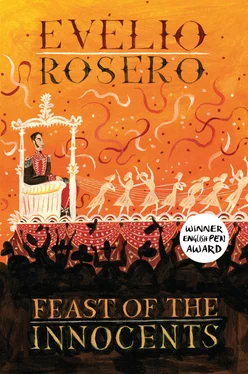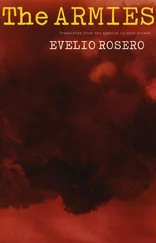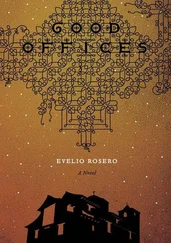He had read in a Sunday paper about a movement of young poets in which the latest ideas were brought together with the positions and impositions of established national poetry. The journalist explained that this was a crowd of young people “mad with a different joy,” and although the poet Puelles did not consider himself mad with joy of any kind, he would have given a leg to find himself among crazed poets reading any of his Nineteen Sugar Bums and an Enchanted Vagina , or simply atoning for or celebrating the poetry of any century, from the first to the last. Poets from every country who were proclaimed by the demented youngsters, philosophers and novelists whom they revered, all of them were already old friends of Puelles — he had read them backwards — and this comforted him, he was not so far off track, in spite of everything, he thought. The in spite of everything was that street, that doctor, that absurd persecution, that dead man hanging around his neck for ever. Puelles looked off in a different direction and scared away the apparition.
From the little hill on which the widow’s house was built you could glimpse a strip of the city, lit up by New Year’s Eve fire: rockets shot straight up into the black sky, and their multicoloured explosions seemed to lightly touch every peak, but “Father Galeras” was unmoved, a great impassive shadow, fleetingly crowned with fireworks— I can do better , Puelles imagined it meant to say.
Occasional cars went up and down the winding road; the festive December noises barely reached this elevated neighbourhood of large, spread-out houses; the road was a narrow carriageway heading down, each curve leaning out over the one below, and there were exactly three bends; on the summit, the concrete smudge of the Bethlemite Sisters’ college stood out, a big empty mass. Below, oblivious Pasto, Puelles thought, lights upon lights.
The book he was reading, The Black Heralds , made him suffer, not so much for the lines he read, but because he had to read with only half his mind; with the other half he had to keep watch on the house into which a certain Doctor Proceso had disappeared. Who was that guy really? A quack, he thought, a distinguished insect. He could not read any more: it felt like he was sitting on ice, his buttocks were numb, his legs asleep. He put the Heralds away in his knapsack and walked down the road, where the night was a distant rumble. On the first and highest of the bends he pushed his way into a dark hollow, between bushes, to pee. From there he observed the continuation of the road, the curve immediately below, flanked with other houses, and then he saw him, sitting on the pavement: Platter Ilyich.
Platter was not reading, he was smoking; not far away from him, in the grass, lay Patricio Quiroz’s orange scooter — the Quiroz brothers were the only “motorized” ones in the group. What was Ilyich doing there? Coincidence? Logistical support? For a second, Puelles was buoyed up: whatever the case, now he had someone to chat with to pass the time, even if it was the loathsome Ilyich, but then something like a light flicked on in his brain. “He’s following me,” he said to himself, “he’s been following me all this time, while I follow the doctor.” And he put two and two together, still incredulous: “He’s following us. He checked how far we went up, and dug himself in down there, where the doctor and I will have to go past sooner or later. What morons, why do they have to tail me? Do they doubt me? Well, when eleven o’clock comes, Platter will have to follow me home: I’m off then, and Vladimir can kiss my ass.”
And while he peed he remembered things about Ilyich from Cali.
He had known him since the first week at university: Ilyich announced to the world that he wrote poems; then that he painted and made sculptures; months later he played the sax; finally, he was an expert on film and photography. For ages they had kept their distance from one another, but they met again — and were both surprised — when they joined the leftist group led by Quiroz: surely that was Ilyich’s true destiny.
And Puelles called him to mind more vividly, suffering over the memory: he had a sharp face, perpetually morose; his eyes and mouth were marked by an unfathomable mistrust, grounded in malice, suspicious of everything, everyone, maybe even himself; his extraordinary, different-coloured eyes were small, a bird of prey’s; his mouth was large, purplish, always wet; his voice was deep, but phoney; everything about him, from top to toe, added up to something repulsive, he thought. Platter was a born traitor, quick to mock and bad-mouth people, he had the habit — which Puelles hated — of speaking ill of whoever had just left the room: he resorted to scathing invention, subtle lies — which the rest, who were afraid of him, applauded as a display of intelligence, how about that? He found it astonishing.
And he remembered him in Bogotá—the two of them active members of the group by then — the day Ilyich introduced him to his friend “Comrade Rosaura.” The pride with which he presented this friend — a mature woman, very short, almost a dwarf, who worked as a domestic servant “in the guts of bourgeois society”—disconcerted Puelles; they met in Rosaura’s room, in a stripped-out tenement building in south Bogotá: the place consisted of a bed, table and chair, a small spirit stove on the floor, an empty little saucepan; mice scampered quickly across the floor, mosquitos attacked, but it was precisely this pitiful narrowness that exalted Ilyich. Resting on the table, open almost at the middle, lay Marx’s hefty tome, Das Kapital , which Rosaura had pointed to, “I’m reading it,” she said. And with cheerful sincerity added: “I don’t understand a word of it, but I’m going to finish it, like I promised Ilyich.” A questioning look escaped Puelles, which he shot — regretting it too late — at Platter Ilyich, believing he would share in it: what was this about reading Das Kapital to the end without understanding it? But the blue and black look he found on Platter’s wan face was fully accepting, a look of triumphant pride. This ended up discouraging him for ever — he would never again expect anything of such an ass, he thought.
And now Platter was brooding down there, a few metres below him, no doubt more bored than he was. Puelles did up his fly; he preferred to go back to thinking about the Medellín poets — there was a light on in those great minds, he thought, and he could at least yell out his poems of humorous love without fear of crucifixion. And he continued with the image of light: us poets are light years away from those pigs, he thought. And he had just thought this when a chilly wind, inopportune like a gust against his skin, that seemed to come from deep inside himself rather than from out there, knocked him flat: could he consider himself “a poet light years away from those pigs?” He asked it in spite of himself. A profound despair welled up inside him; he was overwhelmed by the fear of himself; he was, above all, a murderer: he had killed, and not in self-defence, he thought. I killed him in an underhanded way, I killed him idiotically, yes, but I killed him. He very rarely forgot about the event, and when he did it was always an ephemeral forgetting, sooner or later, and sooner rather than later, sleeping or waking, the mild figure of the policeman appeared to him, leaving the shop with a bottle of milk in his hand.
As if invoking otherworldly forces, Rodolfo Puelles took refuge in poetry and from the whole of his memory chose the words of William Blake, clung to them as if they were a plank floating on the ocean: “ Drive your cart and your plow over the bones of the dead .” What’s more, hadn’t he read in some great Russian novel that you can kill and rob and, nevertheless, be happy? Where had he read that? And he repeated to himself over and over that he was a poet, above all and in spite of it all, and that no matter what, he was light years away from those pigs, I’m a poet, that’s what I am, come what may.
Читать дальше












